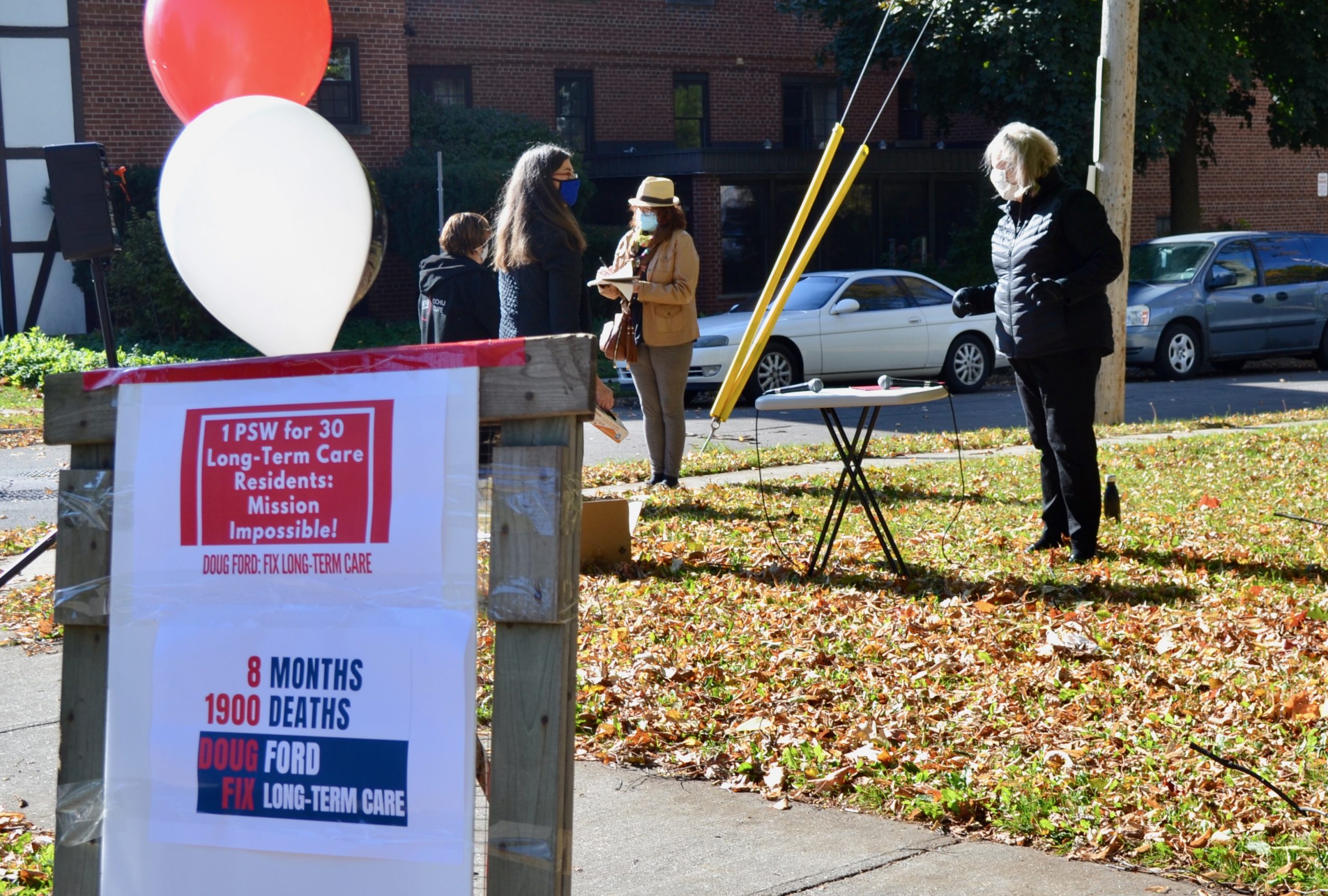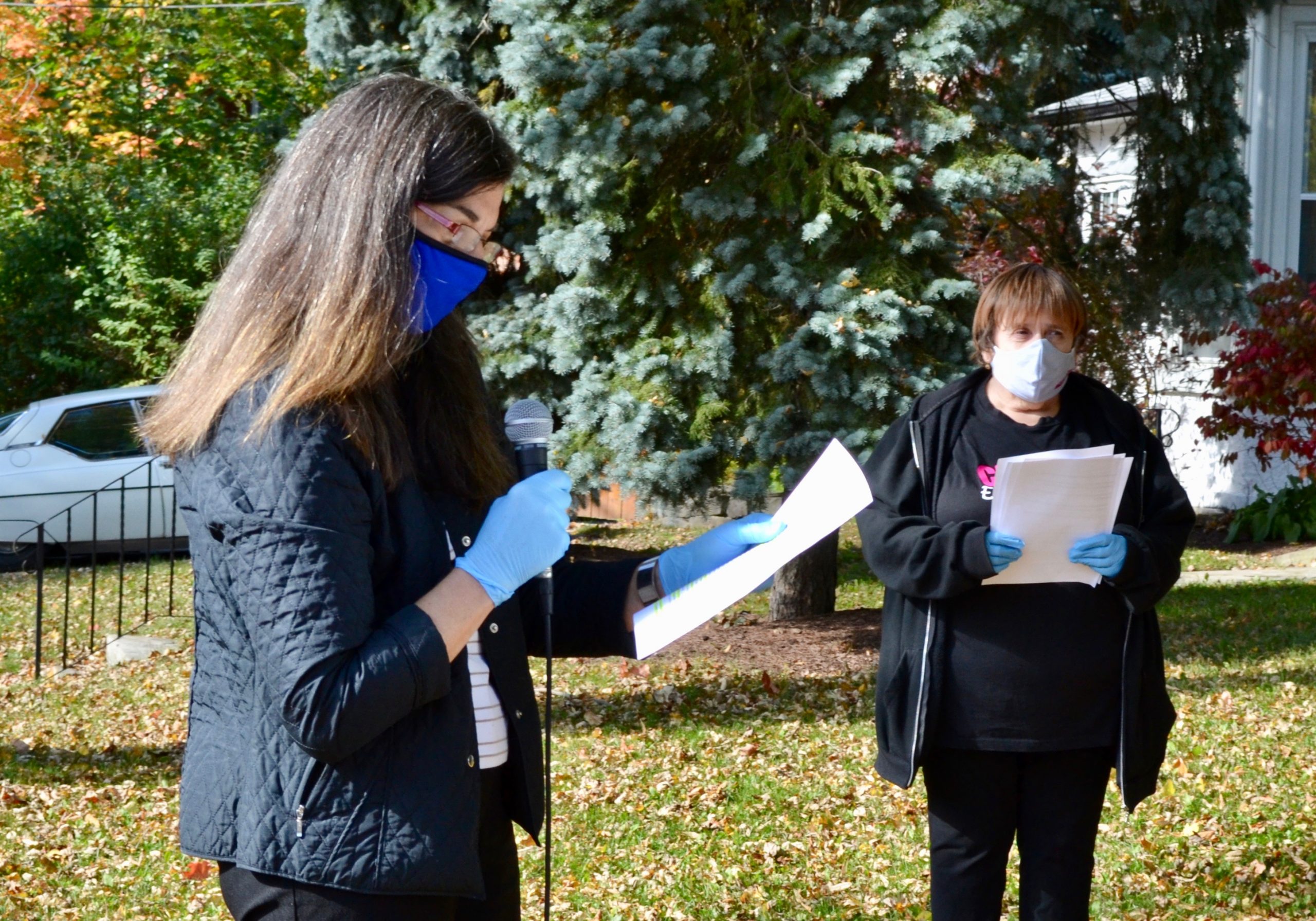GUELPH – A second wave of COVID-19 is brewing, and residents and staff at long-term care homes, who bore the brunt of the virus in the first wave, are still vulnerable.
That is why the Ontario Health Coalition (OHC) put out an urgent call for the province to improve conditions in long-term care homes for residents and staff.
Chapters of the coalition held press conferences and motorcades at locations across the province on Oct. 8.
In Guelph, about a dozen people gathered at the corner of Norfolk and Liverpool streets downtown to hear their call to action.
“This has been a concern from the late 1990s,” said Joan Corradetti, chair of the Ontario Public Service Employees Union (OPSEU) long-term care sector, in an interview prior to the event.
“This is not new. The number of for-profit long-term care and retirement homes has increased sharply.
“That’s a problem because profits come before care.”
Corradetti said that since the ‘90s, the acuity of patients has increased and staffing levels have not kept pace.
“Workload has increased, injuries have increased, and burnout is on the rise – especially now,” she said.
Corradetti explained it’s hard to attract young people to the profession.
She said better wages and more full-time work – as opposed to piecing together full-time hours through part-time jobs at different facilities – would go a long way.
“If that would happen, we would get more people taking up this kind of work,” she noted.
Magee McGuire of the Guelph Wellington OHC said even though the province added 150 extra infection control nurses to long-term care since the pandemic began, “that’s not even one per (long-term care) home.
“Dollars have been promised but they are not flowing.”
During the first wave of the pandemic, hospitals cancelled all elective surgeries and procedures to free up beds and staff for COVID-19 patients.
Staff were then redeployed to assessment centres and long-term care homes when outbreaks began.

Organizers set up for a press conference in Guelph for the Ontario Health Coalition on Oct. 8. Photo by Joanne Shuttleworth
“Now hospitals are at 100 per cent capacity. There’s nowhere to go,” when the second wave hits, McGuire said.
Linda Pelligrini, president of CUPE Local 57, which represents 600 workers at Guelph General Hospital, said three-quarters of the deaths of long-term care residents to date in Ontario have been in privately-owned homes, where profit is the motivator.
“Eighteen hundred long-term care residents died without hospital care” in the first wave, she said.
“We will not stop pushing for quality care.”
OHC is lobbying for four hours a day of personal care for residents in long-term care.
The Time to Care Act, a private member’s bill that would amend the Long-Term Care Act to include this new standard of care, will have its second reading in the Ontario legislature this month.
Laurie Nicol, vice president of Concerned Friends of Citizens in Care, said residents typically get six minutes of care, which is why many families opt to hire outside personal support workers to ensure their loved one is comfortable and regularly bathed, dressed and fed.
The proposed change “is one piece, but really, we need an overhaul of the entire system and develop a new strategy for caring for our elderly,” Nicol said.
“It’s mind-boggling that we allow this to happen.”
The OHC is calling for:
- immediate action by the provincial government to recruit and train staff, improve pay and working conditions and provide full-time work for staff at long-term care homes;
- the province to implement a minimum care standard of four hours of hands-on care per resident per day; and
- both the federal and provincial governments to end for-profit long-term care, starting by making Revera public.
Revera is a private company that owns and operates more than 500 long-term care and retirement residences across North America and the United Kingdom.
For more information about the OHC call to action, visit www.ontariohealthcoalition.ca.




